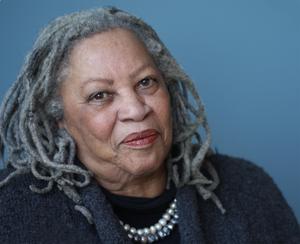 "This is a sacred space," said Kevin Young, addressing the crowd that filled the Cathedral of St. John the Divine in New York City last Thursday for a celebration of the life of Toni Morrison. "Not least of which because it is resonant with writing and writers who, like Morrison, wrote themselves free."
"This is a sacred space," said Kevin Young, addressing the crowd that filled the Cathedral of St. John the Divine in New York City last Thursday for a celebration of the life of Toni Morrison. "Not least of which because it is resonant with writing and writers who, like Morrison, wrote themselves free."
Young--poetry editor of the New Yorker and director of the Schomburg Center for Research in Black Culture--continued: "It is also, as you know, the space where James Baldwin's funeral was held in 1987, where Morrison offered a eulogy for her friend." Young described Morrison's impact on him, as a college student and budding writer, and later as a friend. "Over the years her own work had helped me to realize two of her many truths: the very serious function of racism is distraction," he said, "And also that the function of freedom is to free someone else."
He closed with Morrison's poem "I Am Not Seaworthy," from her book Five Poems, which begins: I am not seaworthy./ Look how the fish mistake my hair for home.
Home emerged as a theme throughout the nearly two-hour tribute by artists, writers and musicians.
Saxophonist David Murray started off with a song of his own called "Home," then segued into a version of Dvorak's "Going Home," and returned to his original composition. What does not come across in the recording of the ceremony is the way Murray made the most of the cavernous reaches of the Cathedral.
These otherworldly musical ideas echoed in the observations of activist and writer Angela Davis about her editor and dear friend of nearly half a century. "She demonstrated a way of being in the world that allowed her simultaneously to inhabit multiple dimensions," Davis said. "She was always here and there at the same time, totally present with you but also at the same time creating new universes." Davis described how Morrison was completely involved in a conversation while they drove together, then, while traffic was stopped on the George Washington Bridge, she jotted notes for the novel she was working on, Song of Solomon, then continued the conversation. "She realized perhaps more than anyone else that deep radical change happens not so much because people march and put themselves on the line, however important this kind of activism might be," Davis said, "but rather because we collectively learn to imagine ourselves on different terms with the world."
Author Fran Lebowitz called Morrison, "Two of my four closest friends." Two-time National Book Award winner Jesmyn Ward described the impact of Morrison's writing on her: with "her patience, her presence, her attention, she told us, 'You are worthy.... I know you. I see you.' " Ta-Nehisi Coates spoke of his father's struggling bookstore on Pennsylvania Avenue in West Baltimore, and how the 1974 nonfiction anthology she edited, The Black Book, came to be in his home, and was discovered by Coates as a child. "The lesson was this," he said, "Black is beautiful but it ain't always pretty." As his editor, he continued, Morrison "was not there to anoint me. She was there to challenge me." Edwidge Danticat, addressing Morrison, said, "You gave us both lullabies and battle cries. You turned pain into flesh and you brought spirits to life. You urged us to be dangerously free. You led this foreigner to a different type of home." Oprah Winfrey, who selected Morrison's books more than any other author's for her book club, said, "With her words as guide and companion, she asks us to follow our own pain. To reckon with it. To transcend it." --Jennifer M. Brown, senior editor

